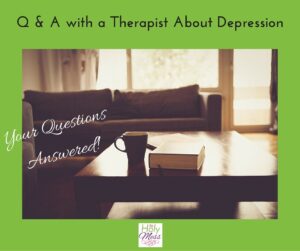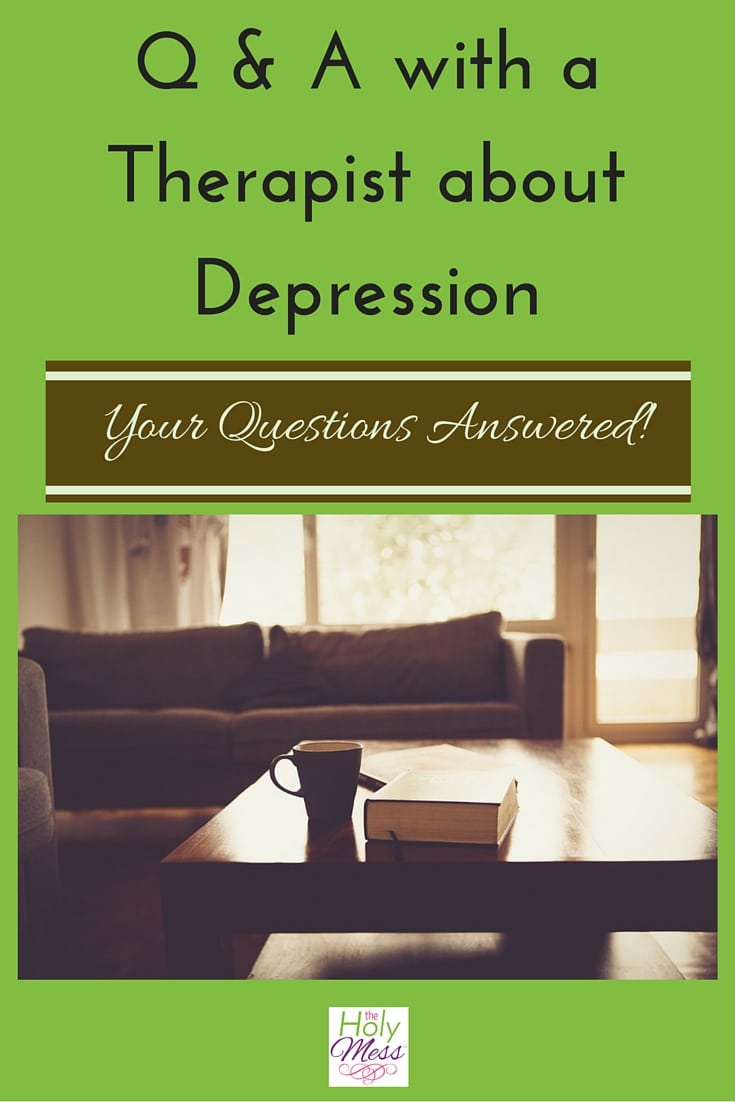- You Are Not Alone (with Depression & Anxiety)
- Depression Does Not Define You
- What Does Depression Look Like?
- 10 Encouraging Bible Verses to Ease Depression
- Navigating Tough Parenting of Teens: When Your Daughter Wants to Dye Her Hair Blue
- How to Manage Depression and Chronic Pain
- Truths About Depression: Stuff You Don’t Want to Hear
- I Got Punched in the Face This Weekend
- Straight Talk About How to Survive Heartbreaking Grief
- For a Day When You Need Motivation
- Sometimes Grief Comes From Unexpected Places
- For Parents of a Teen Who Had a Near Miss
- 10 Simple Ways to Bring Creativity to Your Life
- A Depression Solution: Speak!
- Q & A with a Therapist about Depression
- 4 Realistic Steps to Motivation When You Are Depressed {Based on Research!)
- How To Get In A Good Mood When Depressed
- Is it Okay to Avoid Pain?
- How Can I Serve If I’m Depressed?
- Do You Have Angry Depression?
- A Room Full of Love: Thoughts After a Loved One’s Suicide
- Top 5 Offbeat I’m Depressed and Nothing’s Gonna Stop Me Now Movies
- What You Need to Know about Postpartum Depression
- Why You Need More Mental Flexibility
- How To Stop Stress Eating
- How to Exercise When You Don’t Feel Like It – 10 Workout Motivation Tips
- A Cure for Panic Attacks: The Potato Chip Method
- Can’t Sleep? Read This at 3:00 AM (When Depression Causes Insomnia)
- Secondary Traumatic Stress: How I Found Healing
- You Were Set Free For a Reason: A Daily Devotion about Freedom in Christ
- If You Write, Please Read This. (Plus, a FREE GIFT for All!)

Q & A with a Therapist about Depression
by Kathy Wyant

Kathy Wyant
- What is the difference between depression and ongoing sadness?
Kathy: Sadness or grief can become clinical and turn into what is diagnosed as depression when it starts to cause significant distress or interfere in a serious way with your daily life. When your job, family, school, relationships or other obligations are being significantly affected this could mean you are suffering from depression. Signs of depression that most of us are aware of – a feeling of sadness or hopelessness, trouble sleeping or sleeping too much, and weight loss or gain could be accompanied by other symptoms such as difficulty concentrating, fatigue, agitation and others.
Just because you spend a few days on the couch or in bed, or even feel sad for what seems to be a long period of time does not necessarily mean you are depressed, but when you find yourself feeling sad for most of the day almost every day of the week, beginning to become unable to fulfill your obligations to work or family or to function normally you may want to consider seeing your doctor or finding a therapist for help.
A good resource is helpyourselfhelpothers.org, where you can find anonymous screenings for yourself or someone else who you think might have a problem with depression or anxiety.
- How do I find a therapist who is right for me?
If I were going to look for a therapist I would start by asking my family physician, other professionals or any friends that might be able to recommend someone that has a good reputation in the area.
You would also want to consider what the therapist specializes in treating. Some therapists focus mainly on marriage and family, individual therapy or drug and alcohol counseling. Be sure to check whether the counselor or agency will take your insurance, since counseling will become costly if you are out of network or paying out of pocket.
You shouldn’t be afraid to switch therapists if you feel like one isn’t working out after three or four sessions, but certainly give it more than one or two sessions as the first few sessions can often be awkward, especially if you haven’t been to a therapist before. It is important to find a therapist that works for you. Just because you aren’t comfortable with a therapist doesn’t mean that you should give up on therapy completely or that therapy won’t work for you. Sometimes it takes a few tries before you find someone who is a good fit for you.
- What if I’ve never been to therapy and am scared to go for the first time?
Like any new experience, going to a therapist for the first time can be scary, but a good therapist will put you at ease fairly quickly. Not knowing what to expect is what makes the first time for anything scary. My best advice would be to ask the therapist or receptionist what to expect at your first visit so that you will be more comfortable going in to the appointment. Your first visit might only involve paper work and some type of assessment to determine your history and what you want to accomplish in therapy.
Remember that although therapy is not always an easy process and can be emotionally painful at times (change and healing can be difficult), you should always feel that you are in control and do not have to do or say anything that makes you too uncomfortable. You are in control.
- I think my child might be depressed or anxious. What should I do next?
Certainly if you think a child is severely depressed or showing any suicidal ideation you should get them help immediately. A child or teen showing signs of unusual withdrawing, talking or obsessing about death or any signs of self-harm should be taken very seriously and be seen by a professional as soon as possible. Also, in children and adolescents depression does not always manifest as a depressed mood, but can show up as irritability.
However, unless it is serious, be careful rushing to judgment on thinking a child is depressed or anxious. Children are emotionally different than adults and what may seem unusual for us might be perfectly normal for them. Mood swings can be very normal for children and especially teens and adolescents.
Sometimes talking to your child first and trying to figure out what is going on and how you can help is going to be much more effective than rushing into trying to force them to them talk to a therapist or see a school counselor.
Again, the resources at helpyourselfhelpothers.org can be helpful to see if further action might be necessary.
- I have to admit, I’m a skeptic. How can talking make any difference in my life? It is what it is.
Therapy is certainly not for everyone, and being skeptical is normal, but it does help many people find help and healing for emotional and psychological problems. Therapy is not just “talking”, otherwise why pay a therapist when you could just talk to your friends or family and get the same results?
A therapist has been trained to guide you through a process of healing and provide education as necessary. They can help you decide where change is needed and know how to make those changes in behavior, thoughts or perception.
Therapy done well helps you reach your personal emotional, relational and behavioral goals. Therapy isn’t just talking about what’s bothering you, it is healing, growing and developing the tools to navigate the rough spots in life more smoothly in the future.
Kathy Wyant lives in the beautiful upstate of South Carolina. She has 13 and 16 year old sons and a daughter in her sophomore year of college. She is a mental health counselor and works for the local Solicitor’s Office with the Juvenile and Adult Drug Court programs. She describes this as “the best job ever”.
The Hope Toolbox

Today’s Bible Memory Verse:
Help me, O Lord my God!
Save me according to your steadfast love!Psalm 109:26
Today’s Journaling Prompt:
Are you willing to reach out for help in times of trouble? Who do you go to for help when you need it?
Helpful Resources, suggested by Kathy:
Nimh.nih.gov
Samhsa.gov
Mentalhealth.gov
- You Are Not Alone
- Depression Does Not Define You
- What Does Depression Look Like?
- 10 Encouraging Bible Verses to Ease Depression
- When Your Daughter Wants to Dye Her Hair Blue
- How to Manage Depression and Chronic Pain
- Truths About Depression: Stuff You Don’t Want to Hear
- I Got Punched in the Face This Weekend
- Straight Talk About How to Survive Heartbreaking Grief
- For a Day When You Need Motivation
- Sometimes Grief Comes From Unexpected Places
- For Parents of a Teen Who Had a Near Miss
- 10 Simple Ways to Bring Creativity to Your Life
- A Depression Solution: Speak!
- Q & A with a Therapist about Depression
- Research Shows 4 Keys to Motivation When You Are Depressed
- 101 Ways to Boost Your Mood Immediately
- Is it Okay to Avoid Pain?
- How Can I Serve If I’m Depressed?
- Do You Have Angry Depression?
- A Room Full of Love: Thoughts After a Loved One’s Suicide
- Top 5 Offbeat I’m Depressed and Nothing’s Gonna Stop Me Now Movies
- What You Need to Know about Postpartum Depression
- Why You Need More Mental Flexibility
- How to Eat Healthy When You Don’t Feel Like It
- How to Exercise When You Don’t Feel Like It
- A Cure for Panic Attacks: The Potato Chip Method
- Can’t Sleep? Read This at 3:00 AM
- Do You Have Secondary Traumatic Stress?
- You Were Set Free For a Reason
- If You Write, Please Read This. (Plus, a FREE GIFT for All!)








Thanks for your post. I found it this morning and needed some direction and help. Depression is been on me for months. Nothing is helping. I will read your info and try your suggestions. Thanks!